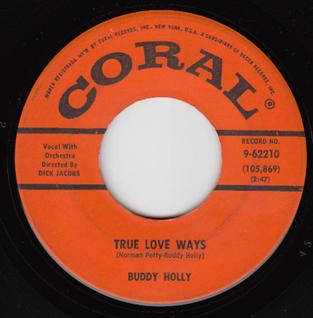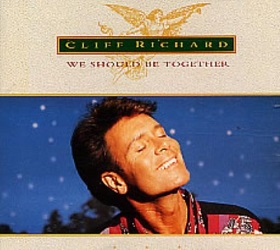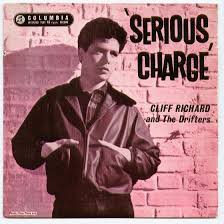
"Do You Want to Dance" is a song written by American singer Bobby Freeman and recorded by him in 1958. It reached number No. 5 on the United States Billboard Top 100 Sides pop chart and No. 2 on the Billboard R&B chart. Cliff Richard and the Shadows' version of the song reached No. 2 in the United Kingdom in 1962, despite being a B-side. The Beach Boys notably covered the song in 1965 for their album The Beach Boys Today!. Retitled "Do You Wanna Dance?", their version reached No. 12 in the United States. A 1972 cover by Bette Midler with the original title restored reached No. 17.

"Living Doll" is a song written by Lionel Bart made popular by Cliff Richard and the Shadows in 1959. It was the top selling single in the UK in 1959. It has topped the UK charts twice: in its original version in 1959 and a new version recorded in 1986 in aid of Comic Relief. It is one of the few songs released by an English singer to chart on the American Billboard charts before the British Invasion occurred.

"The Next Time" backed with "Bachelor Boy" was the first of three number one hit singles from the Cliff Richard musical, Summer Holiday. Both sides were marketed as songs with chart potential, and the release is viewed retroactively as a double A-side single. However, technically double A-sides were not regarded as such until 1965, so "The Next Time" was pressed as the A-side, with "Bachelor Boy" the B-side. The song was succeeded at number one by The Shadows' "Dance On!".

"True Love Ways" is a song attributed to Norman Petty and Buddy Holly. Buddy Holly's original was recorded with the Dick Jacobs Orchestra in October 1958, four months before the singer's death. It was first released on the posthumous album The Buddy Holly Story, Vol. 2, in March 1960. The song was first released as a single in Britain in May 1960, reaching number 25 on the UK Singles Chart. It was released the following month in the US, but did not make the charts. In 1988, a UK re-release of the recording by MCA, the single reached no. 65 on the UK singles chart in a 5 week chart run.

"Summer Holiday" is a song recorded by Cliff Richard and the Shadows, written by rhythm guitarist Bruce Welch and drummer Brian Bennett. It is taken from the film of the same name, and was released as the second single from the film in February 1963. It went to number one in the UK Singles Chart for a total of two weeks. After that, the Shadows' instrumental "Foot Tapper"—also from the same film—took over the top spot for one week, before "Summer Holiday" returned to the top spot for one further week. The track is one of Richard's best known titles and it remains a staple of his live shows. It was one of six hits Richard performed at his spontaneous gig at the 1996 Wimbledon Championships when rain stopped the tennis.

"Bachelor Boy" is a song by Cliff Richard and the Shadows, written by Richard and Bruce Welch. It became a hit when it was released as the B-side of Richard's single "The Next Time". Both sides of the single were regarded as having chart potential so both sides were promoted and in many markets "Bachelor Boy" became the bigger hit. The single spent three weeks at No. 1 in the UK Singles Chart in January 1963 and was a major hit internationally, although it only reached No. 99 in the US. Both sides of the single were included on the accompanying soundtrack album Summer Holiday. On the soundtrack album the Michael Sammes Singers were credited as backing singers, although they were not credited on the single.

"Please Don't Tease" is a 1960 song recorded by Cliff Richard and the Shadows. Recorded in March and released as a single in June, the song became their third No. 1 on the UK Singles Chart spending three weeks at the summit. The song was written by the Shadows' rhythm guitarist Bruce Welch together with Pete Chester.

"My Pretty One" is a song recorded by English singer Cliff Richard and released in the UK in June 1987 as the lead single from his Always Guaranteed album. The song reached number 6 in the UK Singles Chart. The song was written by Alan Tarney who had previously written some of Richard's most successful tracks since his 1976 renaissance, including "We Don't Talk Anymore", "Dreamin'", "A Little in Love" and "Wired for Sound". The song was originally recorded and released by Jamie Rae in 1985 as Pretty One.

"We Should Be Together" is a Christmas-themed song by Cliff Richard. Released as a single in November 1991 in the UK, the song was considered a contender for the Christmas number one spot but peaked at number 10.
"I'm Looking out the Window" is a ballad written by Don Raye and John Jacob Niles. Peggy Lee first recorded the song as a B-side for her 1959 single "Hallelujah, I Love Him So". The song is best known as a hit record for Cliff Richard in 1962 in numerous countries, although not in the United States.

Small Corners is a 1978 album of Contemporary Christian music by British singer Cliff Richard. It is his twentieth studio album and third gospel album. It was recorded in Abbey Road Studios in January 1977.

"More to Life" is a theme-song to the early 1990s Trainer TV series. The song was written by Simon May and Mike Read. The theme won them a TRIC award for Best TV Theme.

Serious Charge is the first EP by Cliff Richard and The Drifters, released in the UK in May 1959 as the soundtrack for the 1959 film of the same name and produced by Norrie Paramor. The EP is a 7-inch 45 RPM vinyl record, released in mono with the catalogue number Columbia SEG 7895. All four tracks were recorded on 28 April 1959 at Abbey Road Studios. It was released nearly a year before the first UK EP Chart was published.

Tracks ‘n Grooves is the sixteenth studio album by British singer Cliff Richard, released November 1970 on the EMI Columbia label. It is his thirtieth album overall. The album reached #37 in the UK Album Charts.

Cliff Richard is the seventh studio album by Cliff Richard, released by Columbia Records on LP in 1965 and available in both mono and stereo. It is Richard's thirteenth album overall. The album peaked at number 9 in the UK Albums Chart.

"Wired for Sound" is a song recorded by English singer Cliff Richard, released in 1981 as the lead single for his album of the same name. The song reached number 4 in the UK Singles Chart and was certified silver by the BPI for sales over 250,000. The song reached number 2 in Australia and South Africa, and was a hit in a number of European countries. The song was written by Alan Tarney and B.A. Robertson.

"Hey Mr. Dream Maker" is a song by Cliff Richard from his album Every Face Tells a Story and the first single to be released from the album. It was released as a single in 1976 reaching number 31 on the UK Singles Chart. It was a top ten hit in South Africa reaching number 6.

"Green light" is a song recorded by Cliff Richard and released as a single in February 1979. It was the third single and title track taken from his 1978 studio album Green Light. The song is written by Alan Tarney who went on to write some of Richard's biggest hits, such as the follow-up single "We Don't Talk Anymore", "Dreamin'" (1980), "Wired for Sound" (1981) and "Some People" (1987).

"I Still Believe in You" is a song recorded by British singer Cliff Richard. It was released as a single in November 1992 and peaked at number 7 in the UK Singles Chart. It was the first single to be released off his 1993 album The Album.

"This New Year" is a new-year themed song by Cliff Richard, released as a single in the UK on 30 December 1991. It was the second single released from his first Christmas album, Together with Cliff Richard.




















